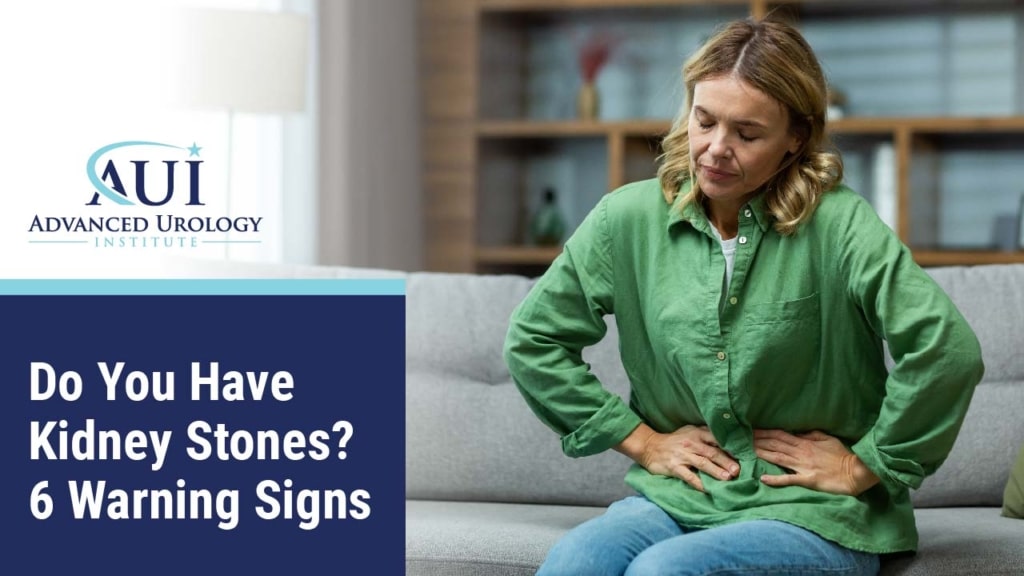Do You Have Kidney Stones? 6 Warning Signs
There’s good reason Florida counted 300,000 new residents in 2023. With 237 sunny days a year and consistently warm temperatures, we have an ideal playground all year long. But those sunny days can also contribute to one of the most common causes of kidney stones: dehydration.
Are you sure of the symptoms?
More than a half a million people rush to emergency rooms seeking relief from kidney stone pain each year; many right are here in Florida. Yet some of these patients might have been tolerating earlier warnings signs, because certain stone symptoms can be misinterpreted as something else, such as a urinary tract infection.
The following information should help you spot the difference.
When Crystals Don’t Clear: Why Stones Occur
Stones are formed by a high concentration of chemicals, notably calcium and oxalates (salt). If your body is dehydrated, you won’t have enough fluid to dissolve these substances and in time they’ll bind, forming crystals that draw other elements, eventually becoming stones.
You may have stones right now and not know it – the risk of developing stones is one in 10, and some can be as small as a grain of sand.
But if a stone grows large enough and tries to travel out of your kidneys, it can get lodged in your urinary tract and force urine back into your kidneys, bladder, and ureters, leading to infection.
How Your Body Warns You About Stones
Kidney stone symptoms can occur anywhere in your urinary tract, starting with the kidneys. Place your hands above the sides of your waist, with your fingers on your back, and you’ve located the kidneys.
Be aware of these red flags:
- Urine that smells like ammonia.
- Blood in your urine (hematuria)
- Painful urination
- Waves of pain on your sides and/or lower back
- Chills and fever (due to infection)
- Nausea and vomiting
Don’t tolerate these symptoms; call your urologist.
What to Expect: Treatment Options for Kidney Stones
Stones are typically diagnosed through urine tests and imaging (including CT scans). If a stone is small enough – one-fifth of an inch or less – it has a 90% chance of passing on its own with the help of pain medication and plenty of water.
If stones cause complications, however, you’ll likely be prescribed one of these treatments:
Lithotripsy – Advised for large stones, this non-invasive approach involves shock waves directed into the body, breaking the stones into pieces small enough to pass.
Ureteroscopy – This incision-free procedure is often used for stones in the ureter. The doctor passes a slim scope through the urethra and bladder to the stone, breaks it up with lasers (if needed), and removes the fragments.
Surgical removal – If stones are very large or complex, the surgeon can extract them through a narrow, medically equipped tube fed through a small incision in the back.
Cast Out Stones: Prevention Tips and Risks
In addition to dehydration, several health factors can contribute to stones. These include obesity, chronic urinary tract infections, inflammatory bowel disease, and certain medications. As for what you can do to prevent stones from forming, here are some tips.
- Just add water, from everything. Fluids come in many forms, including tea and coffee and fruits and vegetables. All in, aim for 11 or more cups daily.
- Drink milk, too. Most kidney stones are formed by calcium, yet it also helps prevent them by binding with oxalates before entering your kidneys, where stones form, so the oxalates pass.
- Change your plate. If you eat a lot of red meat, salty processed foods, and sugary treats, replace several servings with fruits and vegetables.
- Drop the smokes. Research shows tobacco smoke carries chemicals that have been linked to stone formation.
Kidney stone treatment is fast and highly effective, but it could take you out of the sun for a little while. So take precautions. If you’re new to the Sunshine State, welcome! Drink more water. Monitor how much you sweat. Feel the sand between your toes, but not in your tract.
Want to learn more? Read more about the risks and treatment options of kidney stones. If you suspect you have kidney stones, contact a specialist at one of our locations.

